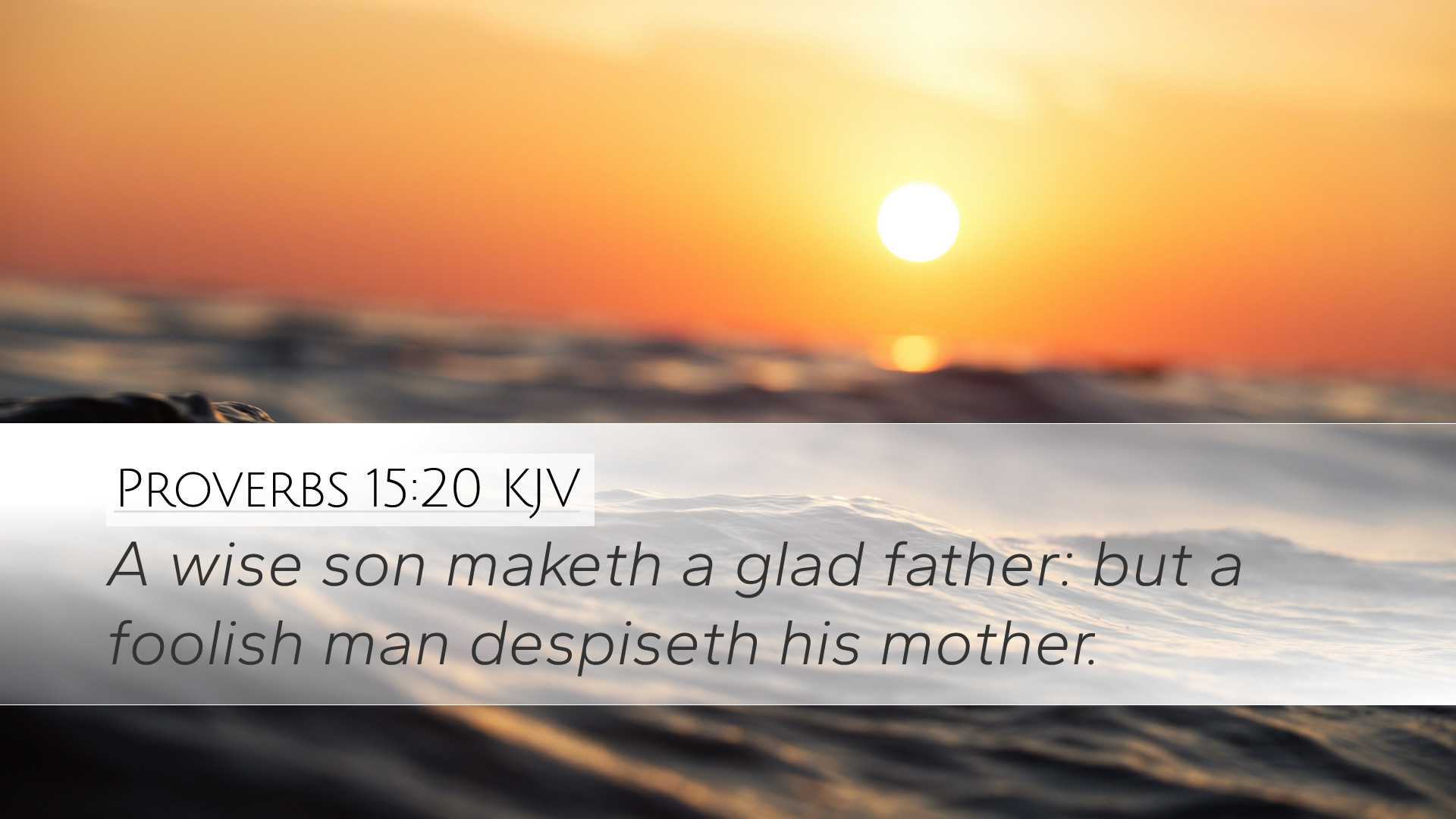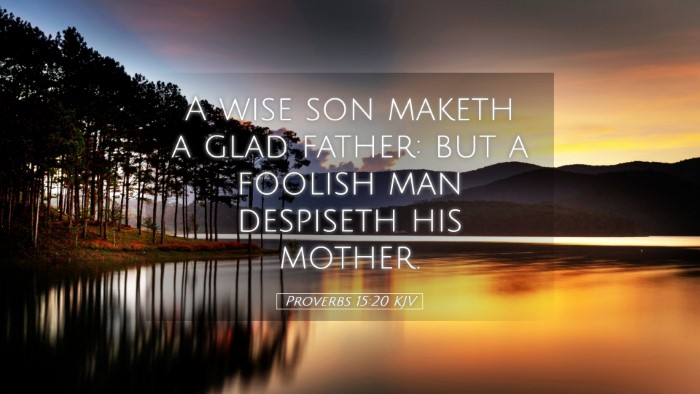Commentary on Proverbs 15:20
Bible Verse: "A wise son makes a glad father, but a foolish man despises his mother."
Introduction
Proverbs 15:20 presents a profound observation on the impact of a child's behavior on parental relationships. At its core, the verse contrasts the attitudes and actions of the wise and the foolish. The wisdom literature often employs such dichotomies to elucidate moral and ethical teachings.
Commentary Insights
1. The Joy of the Wise Son
Matthew Henry emphasizes that a wise son brings joy and satisfaction to his father. The term "wise" denotes someone who not only possesses knowledge but also applies it rightly. This indicates that the son’s wisdom is manifested through good behavior, moral integrity, and respect for his parents. Henry suggests that the wise son’s actions reflect his understanding of his responsibilities and the value of his family.
Albert Barnes adds that the happiness of a father is significantly associated with the conduct of his children. The delight of a father in his son is linked to the son's choices—living virtuously and making decisions that align with his moral upbringing. This sentiment emphasizes the relational dynamics and responsibilities inherent in family life.
2. The Consequences of Foolishness
In contrast, the latter part of the verse states that "a foolish man despises his mother." Adam Clarke interprets this as a reflection of severe moral decay. A fool, in biblical terms, is someone who lacks discretion and shows contempt for wisdom and guidance. Clarke points out that despising one's mother, who typically represents nurturing and wisdom, illustrates a core rejection of familial and social values.
Matthew Henry further elaborates that such foolishness often leads to not just personal ruin but also sorrow for parents. He notes that the actions of a foolish child can cause deep emotional pain and dishonor to the parent, indicating that a strong familial bond is vital for societal stability.
3. The Relationship Between Wisdom and Family
This verse encapsulates the essence of wisdom's role within the family. Albert Barnes comments on the notion that families flourish when members act wisely, suggesting that wisdom is a communal attribute that can strengthen emotional ties. When a child acts wisely, the benefits extend beyond the individual, positively impacting the family unit as a whole.
4. Contextual Interpretation
Within the broader context of Proverbs, this verse exemplifies the teaching style of the authors, who often juxtapose the life paths of the wise versus the foolish. Adam Clarke suggests that the wisdom literature serves didactic purposes, aiming to instill practical morality in everyday life. Each proverb acts as a guide to navigating the complexities of human relationships and ethical conduct.
The family is depicted as a microcosm of society—where wise actions lead to harmony and foolishness fosters discord. The wisdom in Proverbs serves as a reminder to pursue a righteous path, subsequently enhancing familial bonds and societal harmony.
Theological Reflection
From a theological perspective, this verse can be seen as reflecting God's desire for harmonious family relationships. The joy of a father and the respect toward a mother resonates with scriptural themes of love and honor within familial structures. Matthew Henry posits that the lordship of God extends to family dynamics, emphasizing obedience and honor as divine expectations. When children embody wisdom, they align themselves with God’s design, leading to blessings for both themselves and their families.
Practical Applications
In light of Proverbs 15:20, several practical applications can be drawn:
- Encouragement for Parents: Parents are encouraged to foster wisdom in their children through guidance, teaching, and example.
- The Importance of Wisdom: Individuals must seek out wisdom in their lives, as both a personal pursuit and a means to bring joy to their families.
- Community Impact: By cultivating wise relationships, individuals contribute to a healthier, more honorable society.
Conclusion
Proverbs 15:20 offers a significant reflection on the relationship between wisdom and family dynamics. Through the lens of public domain commentaries, the layered meanings of this verse articulate the profound effects of a child's behavior on parental joy and the serious implications of foolishness. The call to wisdom is not merely an individual endeavor but a collective familial responsibility that ultimately shapes society.


